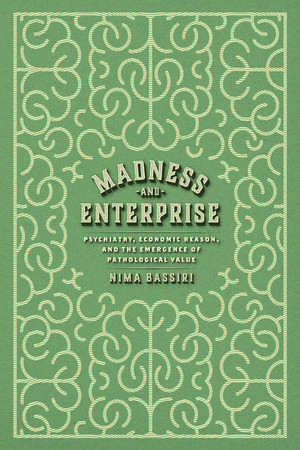Madness and Enterprise: Psychiatry, Economic Reason, and the Emergence of Pathological Value
Autor Nima Bassirien Limba Engleză Paperback – 18 ian 2024
Madness and Enterprise reveals the economic norms embedded within psychiatric thinking about mental illness in the North Atlantic world. Over the course of the nineteenth century, various forms of madness were subjected to a style of psychiatric reasoning that was preoccupied with money. Psychiatrists across Western Europe and the United States attributed financial and even moral value to an array of pathological conditions, such that some mental disorders were seen as financial assets and others as economic liabilities. By turning to economic conduct and asking whether potential patients appeared capable of managing their financial affairs or even generating wealth, psychiatrists could often bypass diagnostic uncertainties about a person’s mental state.
Through an exploration of the intertwined histories of psychiatry and economic thought, Nima Bassiri shows how this relationship transformed the very idea of value in the modern North Atlantic, as the most common forms of social valuation—moral value, medical value, and economic value—were rendered equivalent and interchangeable. If what was good and what was healthy were increasingly conflated with what was remunerative (and vice versa), then a conceptual space opened through which madness itself could be converted into an economic form and subsequently redeemed—and even revered.
| Toate formatele și edițiile | Preț | Express |
|---|---|---|
| Paperback (1) | 215.82 lei 3-5 săpt. | +17.44 lei 6-12 zile |
| University of Chicago Press – 18 ian 2024 | 215.82 lei 3-5 săpt. | +17.44 lei 6-12 zile |
| Hardback (1) | 621.08 lei 6-8 săpt. | |
| University of Chicago Press – 19 ian 2024 | 621.08 lei 6-8 săpt. |
Preț: 215.82 lei
Nou
Puncte Express: 324
Preț estimativ în valută:
41.30€ • 44.100$ • 34.80£
41.30€ • 44.100$ • 34.80£
Carte disponibilă
Livrare economică 03-17 aprilie
Livrare express 19-25 martie pentru 27.43 lei
Preluare comenzi: 021 569.72.76
Specificații
ISBN-13: 9780226830896
ISBN-10: 0226830896
Pagini: 352
Ilustrații: 6 halftones
Dimensiuni: 152 x 229 x 23 mm
Greutate: 0.45 kg
Editura: University of Chicago Press
Colecția University of Chicago Press
ISBN-10: 0226830896
Pagini: 352
Ilustrații: 6 halftones
Dimensiuni: 152 x 229 x 23 mm
Greutate: 0.45 kg
Editura: University of Chicago Press
Colecția University of Chicago Press
Notă biografică
Nima Bassiri is assistant professor of literature at Duke University, where he is also the codirector of the Institute for Critical Theory.
Recenzii
“Bassiri has made a valuable addition to the study of the human and behavioral sciences, bringing new insights from the critical study of capitalism to his subject. . . . Historians of nineteenth-century psychiatry will be interested in his compelling reading of psychiatric debates. Psychiatrists committed to radical disciplinary reform will be stimulated by the proposals in the conclusion. Moreover, the book’s conceptual and methodological interventions will be relevant broadly to historians of the human and behavioral sciences from the nineteenth century to the present—although Bassiri’s narrative stops in the early twentieth century, we are certainly still living in a world shaped by the economic reason of madness.”
“Bassiri offers a rich blend of social theory, history, and philosophy of the human sciences to uncover what he terms a new ‘economization of madness’ that emerged at the turn of the last century. . . . For readers interested in the fascinating ‘borderlands’ of human behavior not clearly legible as either sane or insane, this book is a rewarding, provocative read.”
“The book offers an extremely interesting and rather understudied perspective. It is very well-written, well-researched and contains a plethora of innovative arguments. Apart from showing how madness became central to economic rationalization, it engages in a critique of modern capitalism based on the irrationality of its social order. . . . This is a fascinating work that would appeal not only to academics, but also to those who are interested in the nature of the interdisciplinary exchange between economics and psychological sciences, and also in the conceptual underpinnings of modern capitalism.”
“Recommended.”
“In this smart and sophisticated book, Bassiri shows us how an economic style of reasoning came to permeate psychiatry at the turn of the century. Not only were economic and psychiatric metaphors constantly entangled with one another but madness itself became central to economic rationalization. This book offers us a radically new perspective on the history of psychiatry. It also puts forth a fascinating philosophy of psychiatry which places irrationalism at the heart of modern capitalism.”
“For too long, we have accepted a contrast between madness and reason and all the more so between madness and economics. But Bassiri brilliantly demonstrates how our conceptions of madness and moral value are shot through with economic ideas, that in modern societies madness has had a fully economic rationality, that this economic rationality matters for social thought as much as for psychiatric treatments. In a historical epistemology that forces us to reread classics of modern psychology as much as relearn its story through half-forgotten intellectuals, he offers something truly original: a theory of suffering amid capitalist enterprise, and of the ways in which we can imagine a form of care unbound by a century and a half of transactional thinking.”
